Contract Law - Analysis of a Contract Law Case Study
VerifiedAdded on 2021/06/16
|5
|1099
|81
Case Study
AI Summary
This case study analyzes a contract law scenario involving a dispute over the supply of feed. The analysis focuses on whether a representation made by the seller about the feed's accreditation by ACO constitutes a condition or a warranty of the contract. It examines the implications of this distinction, particularly regarding the buyer's right to terminate the contract and claim damages in case of a breach. The case references relevant case laws like Ellul and Ellul v Oakes, Poussard v Spiers, and Bettini v Gye to support the arguments. The study also addresses the applicability of an exclusion clause in the contract, considering the provisions of Section 64 of the Australian Consumer Law (ACL). The conclusion clarifies that the representation regarding ACO accreditation is a condition, entitling the buyer to end the contract and seek damages if breached. Additionally, the analysis determines that clause 6 is a warranty, and the exclusion clause is not applicable due to ACL regulations.
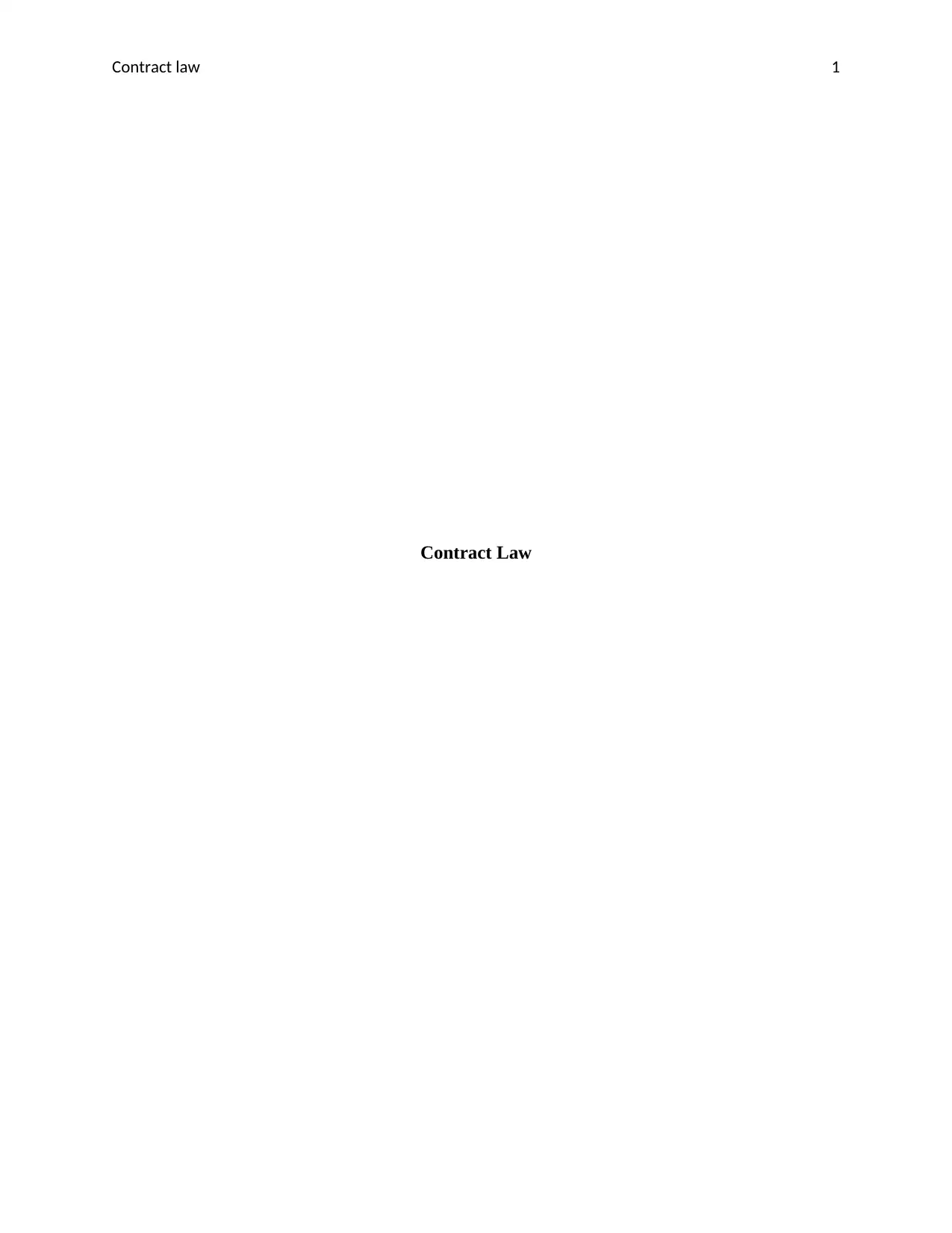
Contract law 1
Contract Law
Contract Law
Paraphrase This Document
Need a fresh take? Get an instant paraphrase of this document with our AI Paraphraser
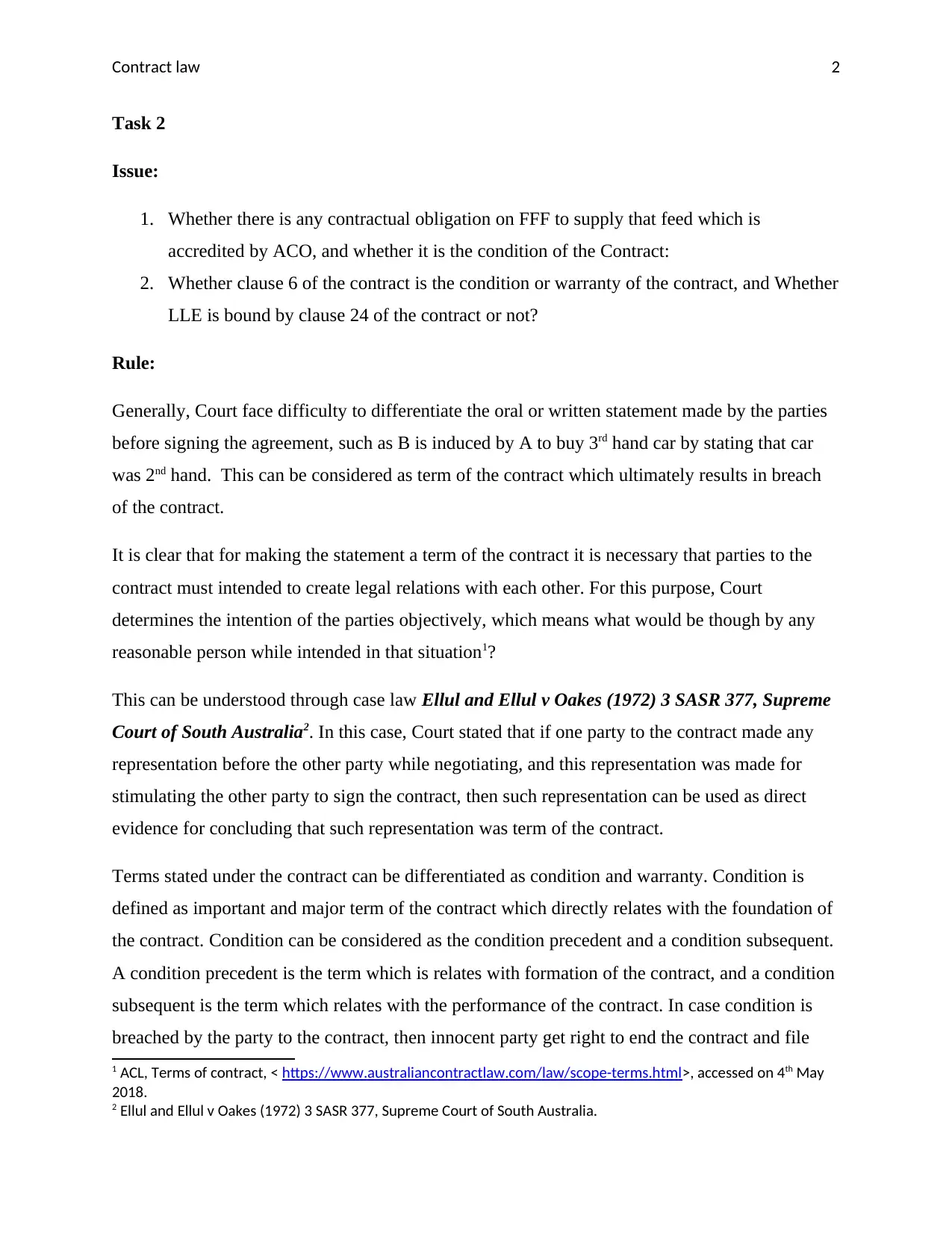
Contract law 2
Task 2
Issue:
1. Whether there is any contractual obligation on FFF to supply that feed which is
accredited by ACO, and whether it is the condition of the Contract:
2. Whether clause 6 of the contract is the condition or warranty of the contract, and Whether
LLE is bound by clause 24 of the contract or not?
Rule:
Generally, Court face difficulty to differentiate the oral or written statement made by the parties
before signing the agreement, such as B is induced by A to buy 3rd hand car by stating that car
was 2nd hand. This can be considered as term of the contract which ultimately results in breach
of the contract.
It is clear that for making the statement a term of the contract it is necessary that parties to the
contract must intended to create legal relations with each other. For this purpose, Court
determines the intention of the parties objectively, which means what would be though by any
reasonable person while intended in that situation1?
This can be understood through case law Ellul and Ellul v Oakes (1972) 3 SASR 377, Supreme
Court of South Australia2. In this case, Court stated that if one party to the contract made any
representation before the other party while negotiating, and this representation was made for
stimulating the other party to sign the contract, then such representation can be used as direct
evidence for concluding that such representation was term of the contract.
Terms stated under the contract can be differentiated as condition and warranty. Condition is
defined as important and major term of the contract which directly relates with the foundation of
the contract. Condition can be considered as the condition precedent and a condition subsequent.
A condition precedent is the term which is relates with formation of the contract, and a condition
subsequent is the term which relates with the performance of the contract. In case condition is
breached by the party to the contract, then innocent party get right to end the contract and file
1 ACL, Terms of contract, < https://www.australiancontractlaw.com/law/scope-terms.html>, accessed on 4th May
2018.
2 Ellul and Ellul v Oakes (1972) 3 SASR 377, Supreme Court of South Australia.
Task 2
Issue:
1. Whether there is any contractual obligation on FFF to supply that feed which is
accredited by ACO, and whether it is the condition of the Contract:
2. Whether clause 6 of the contract is the condition or warranty of the contract, and Whether
LLE is bound by clause 24 of the contract or not?
Rule:
Generally, Court face difficulty to differentiate the oral or written statement made by the parties
before signing the agreement, such as B is induced by A to buy 3rd hand car by stating that car
was 2nd hand. This can be considered as term of the contract which ultimately results in breach
of the contract.
It is clear that for making the statement a term of the contract it is necessary that parties to the
contract must intended to create legal relations with each other. For this purpose, Court
determines the intention of the parties objectively, which means what would be though by any
reasonable person while intended in that situation1?
This can be understood through case law Ellul and Ellul v Oakes (1972) 3 SASR 377, Supreme
Court of South Australia2. In this case, Court stated that if one party to the contract made any
representation before the other party while negotiating, and this representation was made for
stimulating the other party to sign the contract, then such representation can be used as direct
evidence for concluding that such representation was term of the contract.
Terms stated under the contract can be differentiated as condition and warranty. Condition is
defined as important and major term of the contract which directly relates with the foundation of
the contract. Condition can be considered as the condition precedent and a condition subsequent.
A condition precedent is the term which is relates with formation of the contract, and a condition
subsequent is the term which relates with the performance of the contract. In case condition is
breached by the party to the contract, then innocent party get right to end the contract and file
1 ACL, Terms of contract, < https://www.australiancontractlaw.com/law/scope-terms.html>, accessed on 4th May
2018.
2 Ellul and Ellul v Oakes (1972) 3 SASR 377, Supreme Court of South Australia.
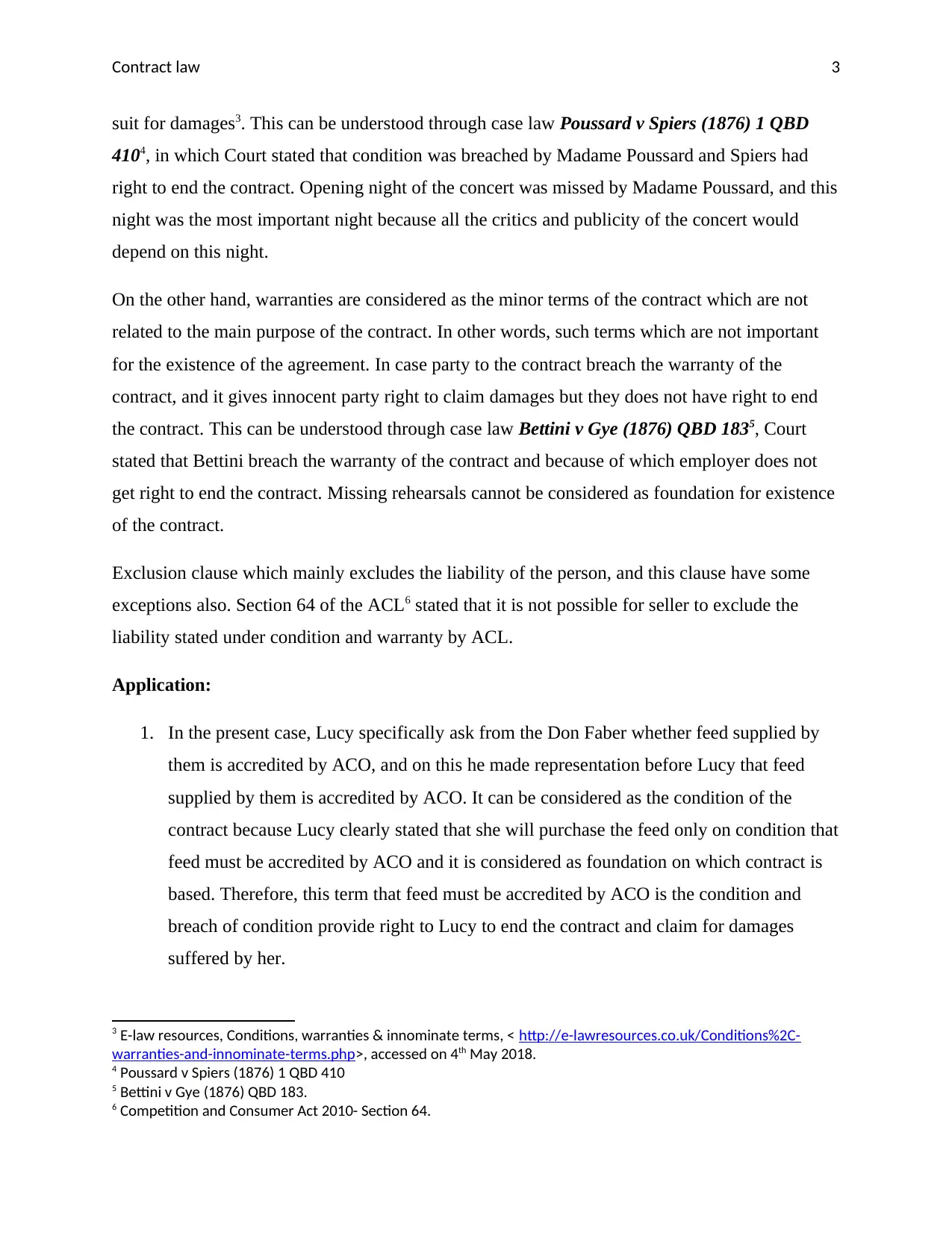
Contract law 3
suit for damages3. This can be understood through case law Poussard v Spiers (1876) 1 QBD
4104, in which Court stated that condition was breached by Madame Poussard and Spiers had
right to end the contract. Opening night of the concert was missed by Madame Poussard, and this
night was the most important night because all the critics and publicity of the concert would
depend on this night.
On the other hand, warranties are considered as the minor terms of the contract which are not
related to the main purpose of the contract. In other words, such terms which are not important
for the existence of the agreement. In case party to the contract breach the warranty of the
contract, and it gives innocent party right to claim damages but they does not have right to end
the contract. This can be understood through case law Bettini v Gye (1876) QBD 1835, Court
stated that Bettini breach the warranty of the contract and because of which employer does not
get right to end the contract. Missing rehearsals cannot be considered as foundation for existence
of the contract.
Exclusion clause which mainly excludes the liability of the person, and this clause have some
exceptions also. Section 64 of the ACL6 stated that it is not possible for seller to exclude the
liability stated under condition and warranty by ACL.
Application:
1. In the present case, Lucy specifically ask from the Don Faber whether feed supplied by
them is accredited by ACO, and on this he made representation before Lucy that feed
supplied by them is accredited by ACO. It can be considered as the condition of the
contract because Lucy clearly stated that she will purchase the feed only on condition that
feed must be accredited by ACO and it is considered as foundation on which contract is
based. Therefore, this term that feed must be accredited by ACO is the condition and
breach of condition provide right to Lucy to end the contract and claim for damages
suffered by her.
3 E-law resources, Conditions, warranties & innominate terms, < http://e-lawresources.co.uk/Conditions%2C-
warranties-and-innominate-terms.php>, accessed on 4th May 2018.
4 Poussard v Spiers (1876) 1 QBD 410
5 Bettini v Gye (1876) QBD 183.
6 Competition and Consumer Act 2010- Section 64.
suit for damages3. This can be understood through case law Poussard v Spiers (1876) 1 QBD
4104, in which Court stated that condition was breached by Madame Poussard and Spiers had
right to end the contract. Opening night of the concert was missed by Madame Poussard, and this
night was the most important night because all the critics and publicity of the concert would
depend on this night.
On the other hand, warranties are considered as the minor terms of the contract which are not
related to the main purpose of the contract. In other words, such terms which are not important
for the existence of the agreement. In case party to the contract breach the warranty of the
contract, and it gives innocent party right to claim damages but they does not have right to end
the contract. This can be understood through case law Bettini v Gye (1876) QBD 1835, Court
stated that Bettini breach the warranty of the contract and because of which employer does not
get right to end the contract. Missing rehearsals cannot be considered as foundation for existence
of the contract.
Exclusion clause which mainly excludes the liability of the person, and this clause have some
exceptions also. Section 64 of the ACL6 stated that it is not possible for seller to exclude the
liability stated under condition and warranty by ACL.
Application:
1. In the present case, Lucy specifically ask from the Don Faber whether feed supplied by
them is accredited by ACO, and on this he made representation before Lucy that feed
supplied by them is accredited by ACO. It can be considered as the condition of the
contract because Lucy clearly stated that she will purchase the feed only on condition that
feed must be accredited by ACO and it is considered as foundation on which contract is
based. Therefore, this term that feed must be accredited by ACO is the condition and
breach of condition provide right to Lucy to end the contract and claim for damages
suffered by her.
3 E-law resources, Conditions, warranties & innominate terms, < http://e-lawresources.co.uk/Conditions%2C-
warranties-and-innominate-terms.php>, accessed on 4th May 2018.
4 Poussard v Spiers (1876) 1 QBD 410
5 Bettini v Gye (1876) QBD 183.
6 Competition and Consumer Act 2010- Section 64.
⊘ This is a preview!⊘
Do you want full access?
Subscribe today to unlock all pages.

Trusted by 1+ million students worldwide
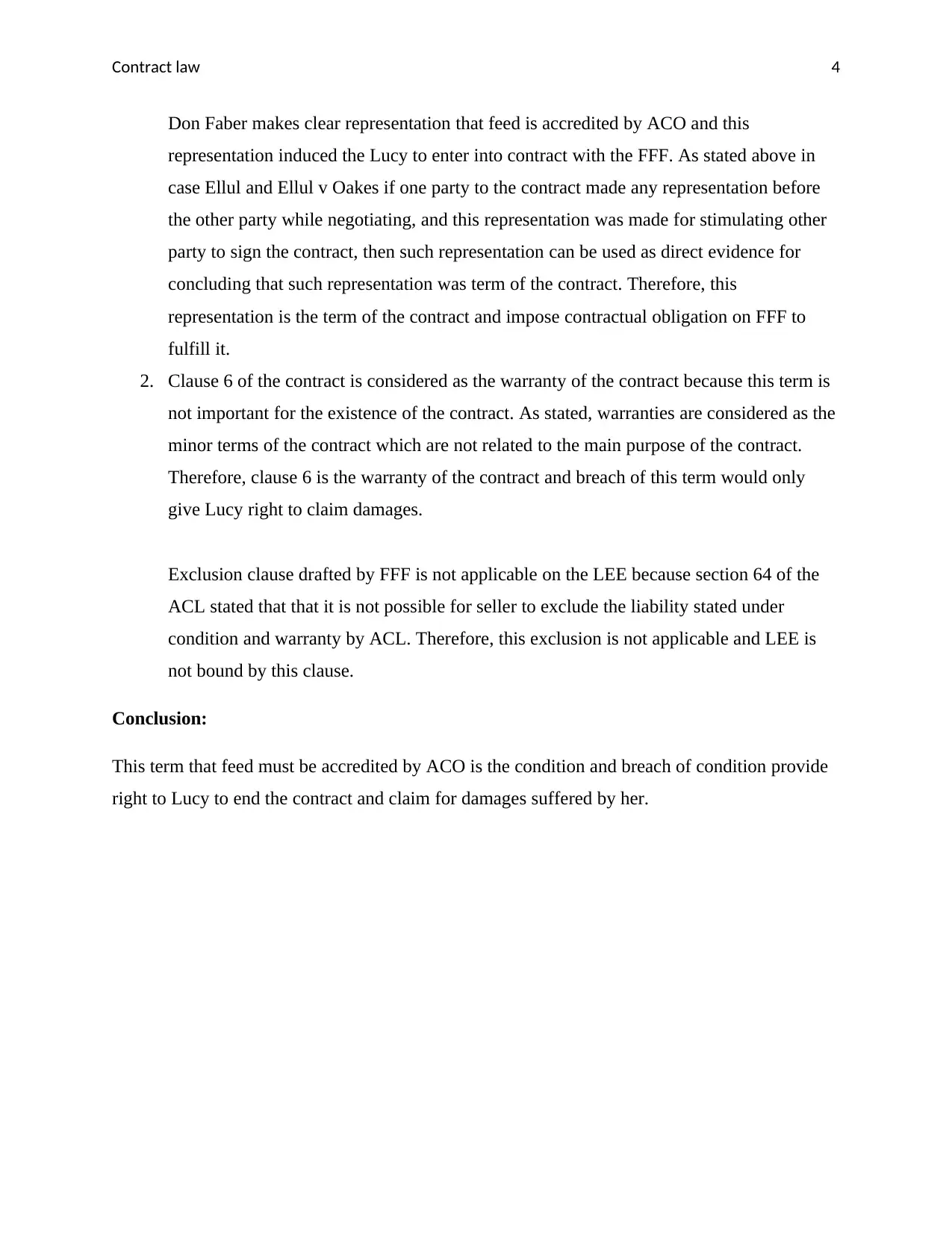
Contract law 4
Don Faber makes clear representation that feed is accredited by ACO and this
representation induced the Lucy to enter into contract with the FFF. As stated above in
case Ellul and Ellul v Oakes if one party to the contract made any representation before
the other party while negotiating, and this representation was made for stimulating other
party to sign the contract, then such representation can be used as direct evidence for
concluding that such representation was term of the contract. Therefore, this
representation is the term of the contract and impose contractual obligation on FFF to
fulfill it.
2. Clause 6 of the contract is considered as the warranty of the contract because this term is
not important for the existence of the contract. As stated, warranties are considered as the
minor terms of the contract which are not related to the main purpose of the contract.
Therefore, clause 6 is the warranty of the contract and breach of this term would only
give Lucy right to claim damages.
Exclusion clause drafted by FFF is not applicable on the LEE because section 64 of the
ACL stated that that it is not possible for seller to exclude the liability stated under
condition and warranty by ACL. Therefore, this exclusion is not applicable and LEE is
not bound by this clause.
Conclusion:
This term that feed must be accredited by ACO is the condition and breach of condition provide
right to Lucy to end the contract and claim for damages suffered by her.
Don Faber makes clear representation that feed is accredited by ACO and this
representation induced the Lucy to enter into contract with the FFF. As stated above in
case Ellul and Ellul v Oakes if one party to the contract made any representation before
the other party while negotiating, and this representation was made for stimulating other
party to sign the contract, then such representation can be used as direct evidence for
concluding that such representation was term of the contract. Therefore, this
representation is the term of the contract and impose contractual obligation on FFF to
fulfill it.
2. Clause 6 of the contract is considered as the warranty of the contract because this term is
not important for the existence of the contract. As stated, warranties are considered as the
minor terms of the contract which are not related to the main purpose of the contract.
Therefore, clause 6 is the warranty of the contract and breach of this term would only
give Lucy right to claim damages.
Exclusion clause drafted by FFF is not applicable on the LEE because section 64 of the
ACL stated that that it is not possible for seller to exclude the liability stated under
condition and warranty by ACL. Therefore, this exclusion is not applicable and LEE is
not bound by this clause.
Conclusion:
This term that feed must be accredited by ACO is the condition and breach of condition provide
right to Lucy to end the contract and claim for damages suffered by her.
Paraphrase This Document
Need a fresh take? Get an instant paraphrase of this document with our AI Paraphraser
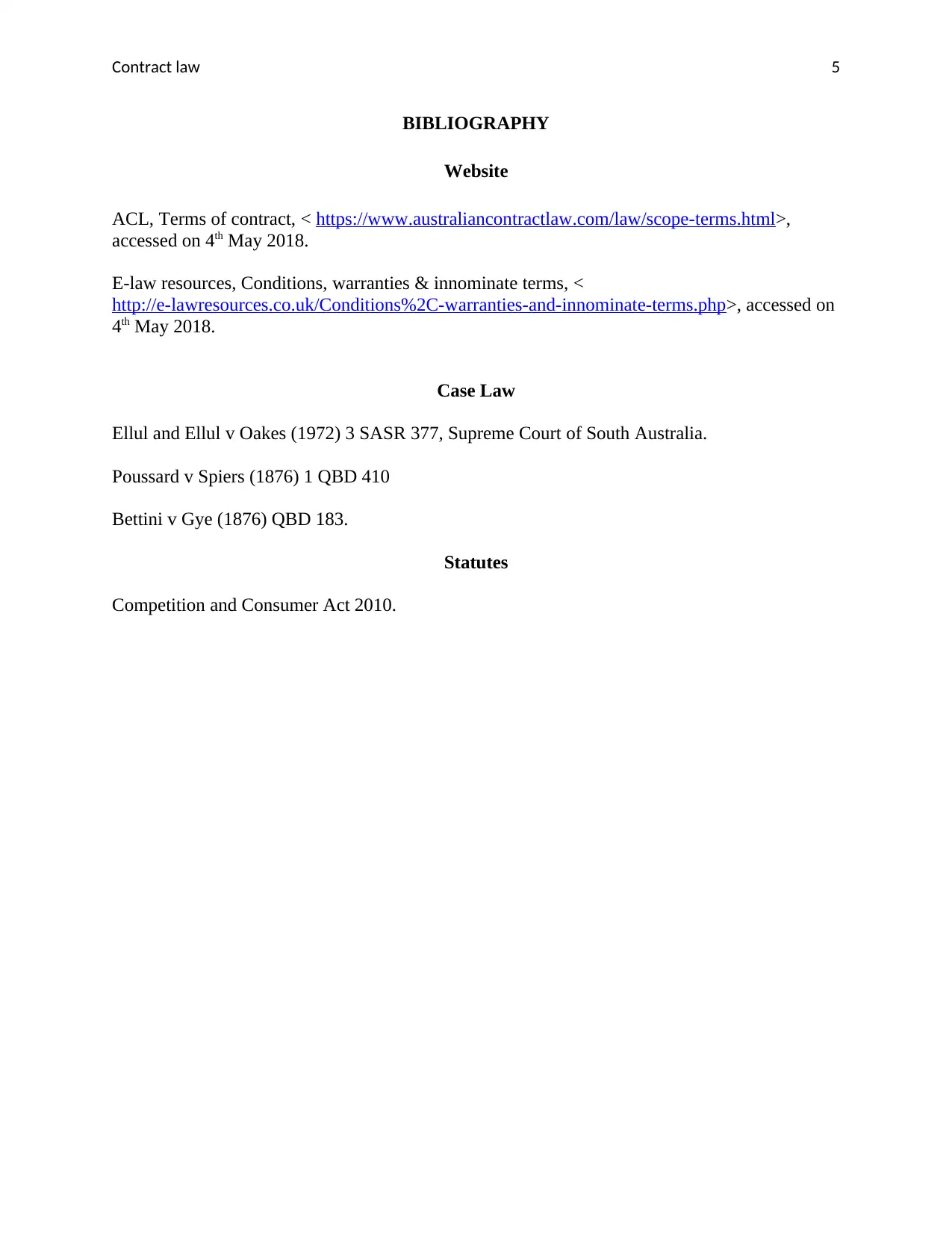
Contract law 5
BIBLIOGRAPHY
Website
ACL, Terms of contract, < https://www.australiancontractlaw.com/law/scope-terms.html>,
accessed on 4th May 2018.
E-law resources, Conditions, warranties & innominate terms, <
http://e-lawresources.co.uk/Conditions%2C-warranties-and-innominate-terms.php>, accessed on
4th May 2018.
Case Law
Ellul and Ellul v Oakes (1972) 3 SASR 377, Supreme Court of South Australia.
Poussard v Spiers (1876) 1 QBD 410
Bettini v Gye (1876) QBD 183.
Statutes
Competition and Consumer Act 2010.
BIBLIOGRAPHY
Website
ACL, Terms of contract, < https://www.australiancontractlaw.com/law/scope-terms.html>,
accessed on 4th May 2018.
E-law resources, Conditions, warranties & innominate terms, <
http://e-lawresources.co.uk/Conditions%2C-warranties-and-innominate-terms.php>, accessed on
4th May 2018.
Case Law
Ellul and Ellul v Oakes (1972) 3 SASR 377, Supreme Court of South Australia.
Poussard v Spiers (1876) 1 QBD 410
Bettini v Gye (1876) QBD 183.
Statutes
Competition and Consumer Act 2010.
1 out of 5
Related Documents
Your All-in-One AI-Powered Toolkit for Academic Success.
+13062052269
info@desklib.com
Available 24*7 on WhatsApp / Email
![[object Object]](/_next/static/media/star-bottom.7253800d.svg)
Unlock your academic potential
Copyright © 2020–2026 A2Z Services. All Rights Reserved. Developed and managed by ZUCOL.





